The herbal personal care products market is projected to grow from USD 92.9 billion in 2025 to USD 177.8 billion by 2035, with a CAGR of 6.7%. A half-decade weighted growth analysis reveals strong growth in the initial years of the forecast period, with a continued, steady increase as the market matures. Between 2025 and 2030, the market grows from USD 92.9 billion to USD 128.5 billion, contributing USD 35.6 billion in growth, with a CAGR of 6.7%.
This early growth is driven by the increasing demand for natural and organic personal care products, as consumers shift toward products with fewer chemicals and more skin-friendly, eco-conscious ingredients. The surge in demand for herbal alternatives in skincare, haircare, and wellness products contributes significantly to the growth during this phase.
From 2030 to 2035, the market continues to expand from USD 128.5 billion to USD 177.8 billion, contributing USD 49.3 billion in growth, with a slightly lower CAGR of 6.5%. The deceleration in growth rate reflects the market's maturity as adoption becomes widespread. However, innovations in product formulations, as well as expanding consumer interest in wellness and self-care, ensure sustained demand. The half-decade weighted growth shows a strong initial contribution from early-phase expansion, followed by steady growth as the herbal personal care market becomes mainstream.
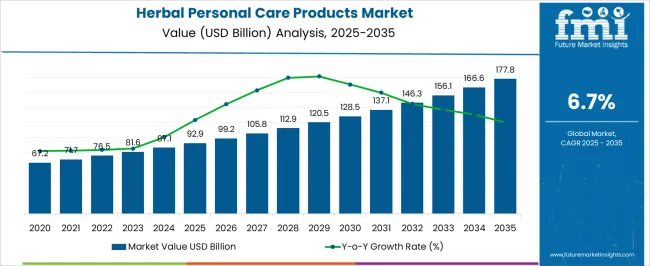
| Metric | Value |
|---|---|
| Herbal Personal Care Products Market Estimated Value in (2025 E) | USD 92.9 billion |
| Herbal Personal Care Products Market Forecast Value in (2035 F) | USD 177.8 billion |
| Forecast CAGR (2025 to 2035) | 6.7% |
The herbal personal care products market is growing steadily, fueled by increasing consumer preference for natural and organic ingredients in skincare and wellness routines. Growing awareness about the potential side effects of synthetic chemicals has shifted demand toward herbal formulations that are perceived as safer and gentler on the skin.
Additionally, wellness trends and holistic health philosophies have encouraged consumers to seek products that combine traditional herbal knowledge with modern cosmetic science. Expansion in e-commerce platforms and social media influence have further boosted visibility and accessibility of herbal personal care brands.
Product innovation focusing on sustainability, eco-friendly packaging, and ethical sourcing is enhancing consumer trust. Future growth is expected to be supported by rising disposable incomes, urbanization, and increasing availability of herbal products in mainstream retail. Segmental growth is anticipated to be led by skin care products within product types, normal skin formulations in skin type, and creams in product form.
The herbal personal care products market is segmented by product type, skin type, form, ingredient, consumer group, price, distribution channel, and region. By product type, it is divided into skin care products, oral care products, makeup and color cosmetics, bath & shower products, fragrances, baby care products, grooming products, hair care products, and others (including intimate care and nail care). By skin type, the market is classified into normal, dry, oily, sensitive, and combination skin. By form, it is segmented into creams & lotions, gels, oils, powders, sprays, and others. By ingredient, the market includes aloe vera, neem, turmeric, sandalwood, rose, tea tree, honey, and other herbal extracts. By consumer group, it is divided into men, women, and children. By price, the market is segmented into economy, mid-range, and premium. By distribution channel, it covers supermarkets & hypermarkets, specialty stores, pharmacies & drugstores, online retail, and others. Regionally, the market is categorized into North America, Latin America, Western Europe, Eastern Europe, Balkan & Baltic Countries, Russia & Belarus, Central Asia, East Asia, South Asia & Pacific, and the Middle East & Africa.
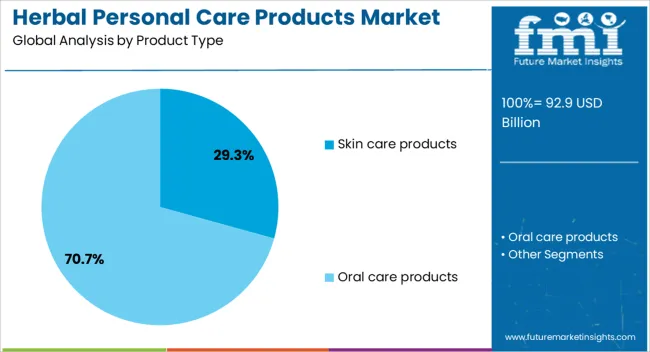
The Skin Care Products segment is projected to account for 29.3% of the herbal personal care products market revenue in 2025, maintaining its leading position. Growth in this segment has been driven by the increasing demand for natural alternatives to conventional skincare solutions that address hydration, anti-aging, and protection.
Consumers have shown a strong preference for herbal skin care products due to their soothing properties and perceived effectiveness in improving skin health. Brands have expanded their offerings with formulations that incorporate botanical extracts, essential oils, and antioxidants, appealing to a broad demographic.
The rise in skin sensitivity issues has also heightened the appeal of herbal products. As consumers prioritize healthier and eco-conscious choices, the Skin Care Products segment is expected to sustain its growth trajectory.
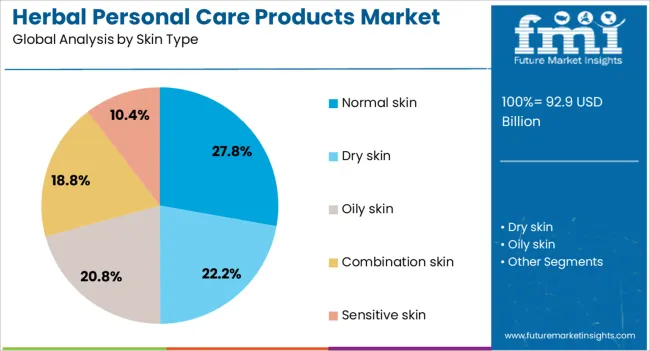
The Normal Skin segment is anticipated to hold 27.8% of the herbal personal care products market revenue in 2025, reflecting its broad consumer base. This segment's growth is attributed to the balanced formulation of products designed to maintain skin health and prevent common issues.
Consumers with normal skin types have increasingly turned to herbal products for gentle maintenance and overall wellness benefits. The accessibility and wide acceptance of these formulations have driven their adoption in both developed and emerging markets.
Additionally, normal skin care products often serve as entry points for consumers exploring herbal personal care, supporting the segment’s prominence. As demand for everyday natural skincare rises, the Normal Skin segment is expected to maintain its market share.
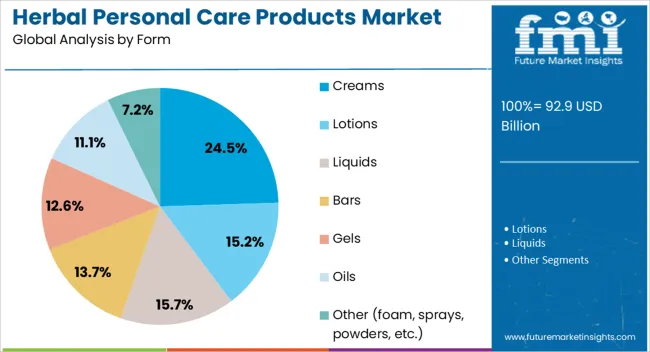
The Creams segment is projected to contribute 24.5% of the herbal personal care products market revenue in 2025, positioning it as the leading product form. Creams have been favored for their ability to provide deep moisturization and nourishment, making them ideal for a range of skin types and conditions.
Herbal creams infused with natural ingredients have gained popularity due to their non-greasy texture and quick absorption. Product innovation has focused on combining efficacy with pleasant sensory experiences such as fragrance and texture, enhancing consumer satisfaction.
The convenience of creams for daily skincare routines and their suitability for use in both professional and personal care settings have supported segment growth. With ongoing interest in natural beauty solutions, the Creams segment is expected to maintain its leading role in the herbal personal care market.
The herbal personal care products market is expanding due to the increasing consumer preference for natural and plant-based ingredients in personal care items. With rising awareness about the potential side effects of synthetic chemicals, consumers are turning to herbal alternatives that offer gentle and effective solutions for skincare, haircare, and oral care. The growing demand for organic and eco-friendly products, along with the increasing adoption of holistic wellness practices, is driving the market forward. challenges such as high costs of raw materials and regulatory barriers remain as the industry evolves.
The primary driver of the herbal personal care products market is the growing consumer preference for natural and organic products. As awareness about the harmful effects of synthetic chemicals in conventional personal care products increases, consumers are opting for herbal alternatives that are perceived as safer and gentler on the skin and hair. This trend is supported by the rising demand for organic ingredients, such as aloe vera, neem, and essential oils, which are used in a wide range of personal care products. The increasing emphasis on wellness and holistic health practices, including natural remedies, is further fueling the adoption of herbal personal care products. Consumers are also seeking products that align with their values, such as eco-friendly and cruelty-free items, which is further driving the growth of the market.
A significant challenge in the herbal personal care products market is the high cost of raw materials. Sourcing high-quality natural ingredients such as herbs, plant extracts, and essential oils can be expensive, especially when compared to synthetic alternatives. The cost of production for herbal-based products is often higher, which can make them less accessible to price-sensitive consumers. The lack of standardization in herbal product formulations and the complexity of regulatory requirements across different countries can also pose challenges. Manufacturers need to comply with varying regulations on labeling, ingredient sourcing, and product claims, which can increase production costs and delays. These hurdles can limit market expansion, particularly for small and medium-sized enterprises.
The herbal personal care products market offers significant opportunities through rising demand in emerging markets and product innovation. As disposable incomes rise in developing economies, particularly in Asia-Pacific, Latin America, and Africa, the demand for herbal personal care products is expected to grow. Consumers in these regions are becoming more aware of the benefits of natural ingredients, leading to increased adoption. The innovations in product formulations, such as the development of new plant-based ingredients, multifunctional products, and personalized skincare solutions, present ample opportunities for market players. As consumer preferences shift toward eco-friendly and sustainable products, there is an opportunity for brands to differentiate themselves by offering organic, cruelty-free, and recyclable packaging options. The expansion of e-commerce platforms also offers an opportunity to reach a broader customer base and penetrate untapped markets.
A prominent trend in the herbal personal care products market is the increasing emphasis on natural and eco-friendly packaging. As consumers become more environmentally conscious, they are seeking products that not only contain natural ingredients but are also packaged in sustainable, recyclable, and biodegradable materials. Manufacturers are responding by adopting packaging solutions that align with these values. Another key trend is the rising popularity of multi-purpose products that combine several benefits, such as skincare products that also provide sun protection or haircare products that promote both growth and nourishment. Consumers are looking for efficiency and simplicity in their personal care routines, driving brands to develop versatile and all-in-one products. These trends are helping shape the future of the herbal personal care market, making it more aligned with consumer demands for sustainability, convenience, and functionality.
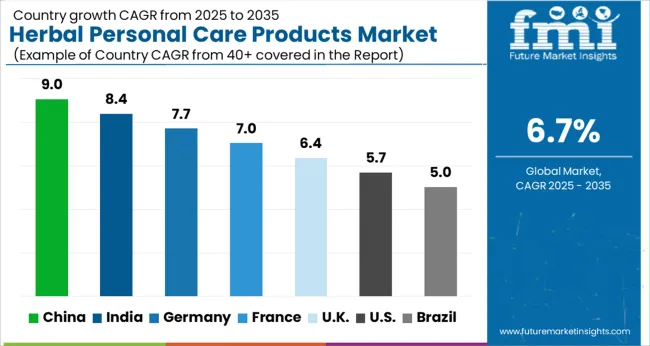
The herbal personal care products market is projected to grow at a CAGR of 6.7% globally from 2025 to 2035. China leads the market with a growth rate of 9.0%, followed by India at 8.4% and Germany at 7.7%. The United Kingdom is expected to grow at 6.4%, while the United States shows a growth rate of 5.7%. In emerging markets like China and India, the demand for herbal personal care products is being driven by the growing preference for natural and organic products, rising awareness of personal health, and increasing disposable incomes. In developed markets like Germany, the UK, and the USA, the adoption of herbal products is supported by a shift towards chemical-free beauty products. The analysis covers 40+ countries, with the leading markets shown below.
China is projected to grow at 9.0% CAGR through 2035, driven by rising awareness of the benefits of herbal and natural ingredients in personal care. The demand for herbal personal care products is being fueled by increasing disposable incomes, urbanization, and the growing preference for organic solutions among Chinese consumers. With a large and growing middle-class population, China’s herbal personal care market is expected to experience strong growth in the coming years. The country’s rapid industrialization, along with an increasing focus on health and wellness, further supports the adoption of herbal products.
India is expected to grow at 8.4% CAGR through 2035, with demand for herbal personal care products rising significantly. The growing popularity of Ayurvedic and natural beauty solutions has led to a surge in the adoption of herbal personal care products in the country. Rising income levels, increased focus on wellness, and a shift towards chemical-free beauty and personal care products are driving this demand. The younger generation in India, more health-conscious and eco-friendly, is contributing to the shift towards natural alternatives in personal care, particularly in skincare and hair care segments.
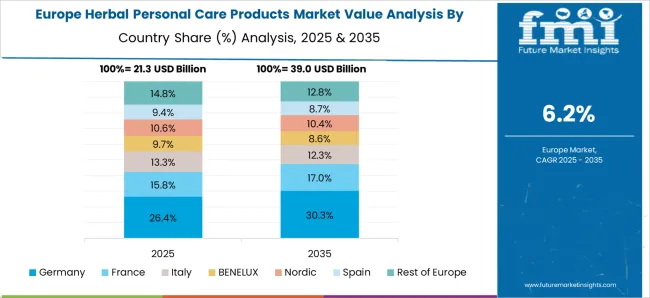
Germany is projected to grow at 7.7% CAGR through 2035, driven by the country’s focus on clean beauty, eco-friendly personal care, and organic ingredients. German consumers are increasingly opting for herbal and natural ingredients in skincare, hair care, and wellness products. The demand for chemical-free beauty solutions and the rising awareness of the harmful effects of synthetic chemicals contribute significantly to the market’s growth. Germany, known for its environmentally conscious population, is also experiencing a surge in demand for cruelty-free and sustainably sourced products, which are further driving the herbal personal care market.
The United Kingdom is expected to grow at 6.4% CAGR through 2035, supported by the rising demand for organic, and natural beauty products. UK consumers are becoming more health-conscious, increasingly opting for products that are free from synthetic chemicals and harmful additives. The shift toward organic skincare, hair care, and wellness products has gained momentum in recent years. The UK government’s support for eco-friendly and cruelty-free products has also contributed to the market's steady growth, as consumers are more inclined to choose ethically sourced and natural personal care options.
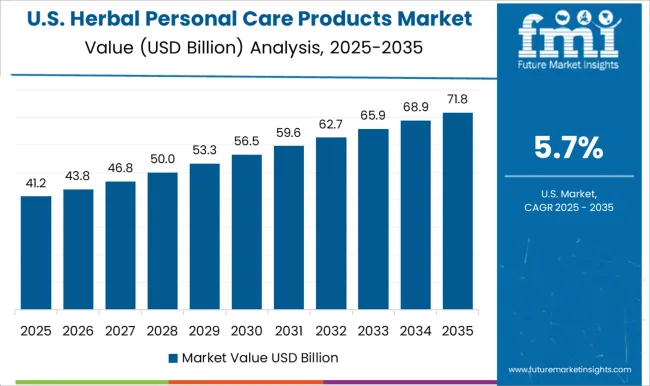
The United States is projected to grow at 5.7% CAGR through 2035, fueled by the increasing consumer demand for natural and organic personal care products. USA consumers are becoming more mindful of the ingredients in their skincare, hair care, and wellness products, with a shift toward herbal and plant-based solutions. The growing interest in green beauty, coupled with awareness of the harmful effects of synthetic chemicals, is pushing the demand for herbal personal care products in the USA The market is also being supported by the increasing number of beauty and wellness brands focusing on eco-conscious, organic formulations.
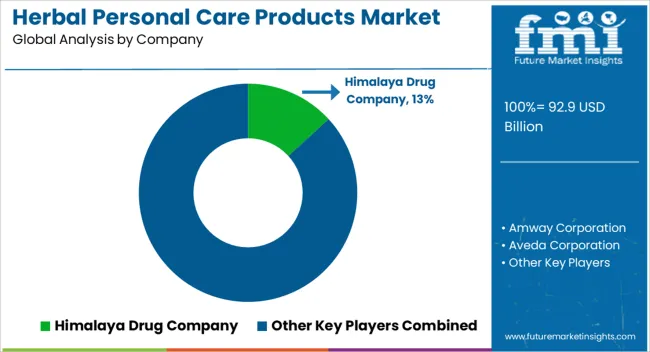
The herbal personal care products market is driven by leading players that focus on natural, plant-based ingredients to meet the growing demand for eco-friendly, safe, and sustainable beauty and wellness products. Himalaya Drug Company is a market leader, offering a wide range of herbal personal care products known for their therapeutic properties, focusing on skin, hair, and wellness solutions.
Amway Corporation provides a diverse portfolio of herbal personal care products through its Nutrilite brand, with an emphasis on natural ingredients and wellness-driven solutions. Aveda Corporation specializes in eco-friendly, plant-based personal care products, offering products that focus on sustainable sourcing and natural beauty solutions. Biotique is a well-known player offering Ayurvedic and herbal products, focusing on skincare and haircare solutions that integrate ancient herbal wisdom with modern scientific research.
Burt's Bees is renowned for its natural, eco-conscious personal care products, including skincare, haircare, and body care items made from 100% natural ingredients. Dabur India Ltd. and Forest Essentials provide herbal skincare and personal care products that emphasize traditional formulations combined with natural, organic ingredients for effective beauty and wellness solutions.
Kama Ayurveda offers premium Ayurvedic personal care products, providing luxury skincare and haircare solutions that focus on holistic wellness and natural ingredients. Khadi Natural and Lotus Herbals focus on producing herbal personal care products with an emphasis on preserving the purity of traditional Ayurvedic formulas, while Lush Fresh Handmade Cosmetics offers eco-friendly, handmade products using fresh, natural ingredients to create sustainable beauty solutions. Oriflame Cosmetics delivers a range of personal care items made with natural ingredients, often combined with modern technology.
Patanjali Ayurved Ltd. is known for its wide range of herbal and Ayurvedic personal care products at affordable prices, while The Body Shop International Limited focuses on cruelty-free, ethically sourced herbal products. Weleda AG offers organic personal care products that combine natural ingredients with sustainable practices to provide skincare solutions rooted in traditional European herbal medicine.
| Item | Value |
|---|---|
| Quantitative Units | USD Billion |
| Product Type | Skin care products, Oral care products, Makeup and color cosmetics, Bath & Shower Products, Fragrances, Baby care products, Grooming products, Hair care products, and Others (intimate care, nail care etc.) |
| Skin Type | Normal skin, Dry skin, Oily skin, Combination skin, and Sensitive skin |
| Form | Creams, Lotions, Liquids, Bars, Gels, Oils, and Other (foam, sprays, powders, etc.) |
| Ingredient | Plant-based ingredients, Essential oils, Natural extracts, and Other herbal ingredients (activated charcoal, dead sea minerals) |
| Consumer Group | Women, Men, and Children |
| Price | Medium, Low, and High |
| Distribution Channel | Offline retail and Online retail |
| Regions Covered | North America, Europe, Asia-Pacific, Latin America, Middle East & Africa |
| Country Covered | United States, Canada, Germany, France, United Kingdom, China, Japan, India, Brazil, South Africa |
| Key Companies Profiled | Himalaya Drug Company, Amway Corporation, Aveda Corporation, Biotique, Burt's Bees, Dabur India Ltd., Forest Essentials, Kama Ayurveda, Khadi Natural, Lotus Herbals, Lush Fresh Handmade Cosmetics, Oriflame Cosmetics, Patanjali Ayurved Ltd., The Body Shop International Limited, and Weleda AG |
| Additional Attributes | Dollar sales by product type (skin care, hair care, body care, oral care, wellness products) and end-use segments (personal use, professional salons, spa services). Demand dynamics are driven by the increasing preference for natural and organic beauty products, growing awareness of the harmful effects of synthetic ingredients, and rising demand for cruelty-free and environmentally friendly products. Regional trends show strong growth in North America and Europe, driven by rising consumer awareness of the benefits of herbal and organic ingredients, while Asia-Pacific is expanding due to the growing demand for Ayurvedic and herbal-based personal care solutions. |
The global herbal personal care products market is estimated to be valued at USD 92.9 billion in 2025.
The market size for the herbal personal care products market is projected to reach USD 177.8 billion by 2035.
The herbal personal care products market is expected to grow at a 6.7% CAGR between 2025 and 2035.
The key product types in herbal personal care products market are skin care products, _face creams & lotions, _body creams & lotions, _moisturizers, _cleansers, _sunscreens, _anti-aging products, _serums, _other (exfoliators, eye creams, lip care etc.), oral care products, _toothpaste, _mouthwash, _tooth powder, _other (breath fresheners etc.), makeup and color cosmetics, _foundation, _lipsticks, _eyeliners, _powders, _others (makeup removers, blushes and highlighters), bath & shower products, _soaps, _shower gels, _bath oils, _bath salts, _others (bath bombs, scrubs etc.), fragrances, _perfumes, _deodorants, _body mists, _others (roll-ons, solid perfumes), baby care products, _shampoos, _lotions, _oils, _wipes, _powder, _others (diaper creams, etc.), grooming products, _beard oils, _aftershave lotions, _shaving creams, _others (waxing strips and kits, razors and trimmers etc.), hair care products, _shampoos, _conditioners, _hair oils, _hair masks, _hair serums, _other (hair tonics, hair sprays, hair dyes and colors etc.) and others (intimate care, nail care etc.).
In terms of skin type, normal skin segment to command 27.8% share in the herbal personal care products market in 2025.






Our Research Products

The "Full Research Suite" delivers actionable market intel, deep dives on markets or technologies, so clients act faster, cut risk, and unlock growth.

The Leaderboard benchmarks and ranks top vendors, classifying them as Established Leaders, Leading Challengers, or Disruptors & Challengers.

Locates where complements amplify value and substitutes erode it, forecasting net impact by horizon

We deliver granular, decision-grade intel: market sizing, 5-year forecasts, pricing, adoption, usage, revenue, and operational KPIs—plus competitor tracking, regulation, and value chains—across 60 countries broadly.

Spot the shifts before they hit your P&L. We track inflection points, adoption curves, pricing moves, and ecosystem plays to show where demand is heading, why it is changing, and what to do next across high-growth markets and disruptive tech

Real-time reads of user behavior. We track shifting priorities, perceptions of today’s and next-gen services, and provider experience, then pace how fast tech moves from trial to adoption, blending buyer, consumer, and channel inputs with social signals (#WhySwitch, #UX).

Partner with our analyst team to build a custom report designed around your business priorities. From analysing market trends to assessing competitors or crafting bespoke datasets, we tailor insights to your needs.
Supplier Intelligence
Discovery & Profiling
Capacity & Footprint
Performance & Risk
Compliance & Governance
Commercial Readiness
Who Supplies Whom
Scorecards & Shortlists
Playbooks & Docs
Category Intelligence
Definition & Scope
Demand & Use Cases
Cost Drivers
Market Structure
Supply Chain Map
Trade & Policy
Operating Norms
Deliverables
Buyer Intelligence
Account Basics
Spend & Scope
Procurement Model
Vendor Requirements
Terms & Policies
Entry Strategy
Pain Points & Triggers
Outputs
Pricing Analysis
Benchmarks
Trends
Should-Cost
Indexation
Landed Cost
Commercial Terms
Deliverables
Brand Analysis
Positioning & Value Prop
Share & Presence
Customer Evidence
Go-to-Market
Digital & Reputation
Compliance & Trust
KPIs & Gaps
Outputs
Full Research Suite comprises of:
Market outlook & trends analysis
Interviews & case studies
Strategic recommendations
Vendor profiles & capabilities analysis
5-year forecasts
8 regions and 60+ country-level data splits
Market segment data splits
12 months of continuous data updates
DELIVERED AS:
PDF EXCEL ONLINE
Personal Care Products Filling System Market Size and Share Forecast Outlook 2025 to 2035
Baby Personal Care Products Market Analysis - Size & Growth 2025 to 2035
Fragranced Personal Care Products Market Analysis - Size and Share Forecast Outlook 2025 to 2035
Anti-Foaming Personal Care Products Market Analysis - Size and Share Forecast Outlook 2025 to 2035
Hyaluronic Acid Personal Care Products Market Overview - Growth & Forecast 2025 to 2035
Personal Care Ingredient Market Size and Share Forecast Outlook 2025 to 2035
Personal Care Appliances Market Size and Share Forecast Outlook 2025 to 2035
Personal Care Wipes Market Size and Share Forecast Outlook 2025 to 2035
Personal Care and Cosmetics Microalgae Market - Beauty & Skincare Trends 2025 to 2035
Personal Care Packaging Market Analysis by Application, Packaging Format, Capacity, and Region Forecast Through 2035
Personal Care Aid Market Growth – Industry Trends & Forecast 2024-2034
Suncare Products Market Size and Share Forecast Outlook 2025 to 2035
Skincare Products Market Size and Share Forecast Outlook 2025 to 2035
Sun Care Products Market Analysis – Growth, Applications & Outlook 2025–2035
Car Care Products Market Trends - Growth, Demand & Analysis 2025 to 2035
Nail Care Products Market Growth, Trends and Forecast from 2025 to 2035
Herbal Medicinal Products Market Size and Share Forecast Outlook 2025 to 2035
Personalized Skincare Serum Market Trends – Demand & Forecast 2024-2034
Facial Care Products Market Size and Share Forecast Outlook 2025 to 2035
Dental Care Products Market Size and Share Forecast Outlook 2025 to 2035

Thank you!
You will receive an email from our Business Development Manager. Please be sure to check your SPAM/JUNK folder too.
Chat With
MaRIA